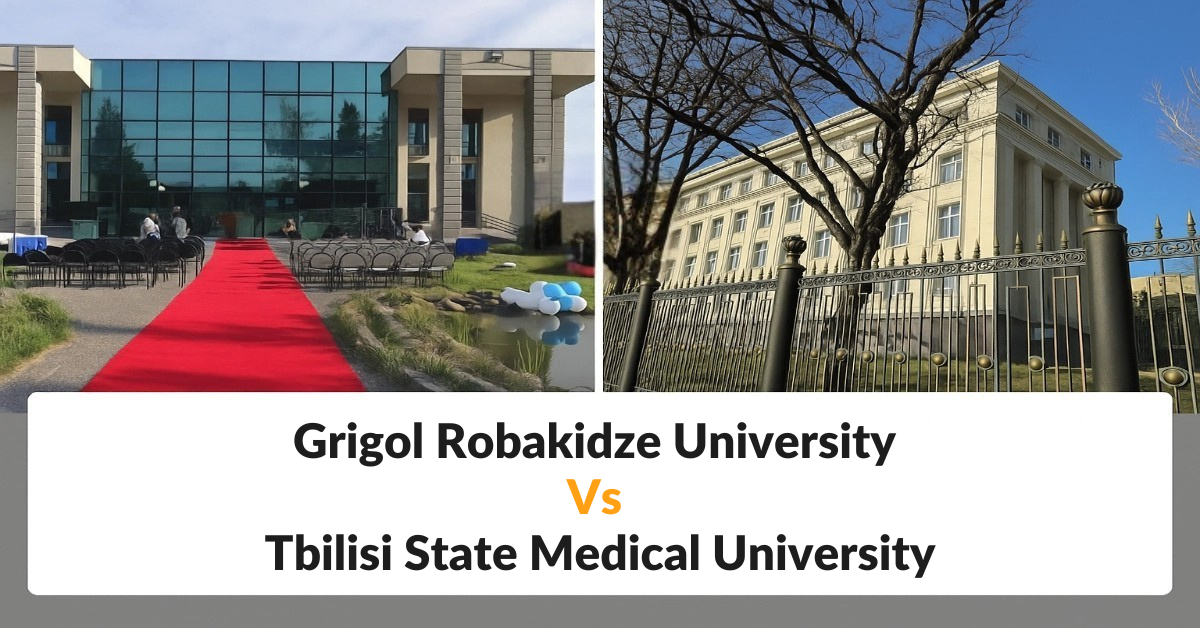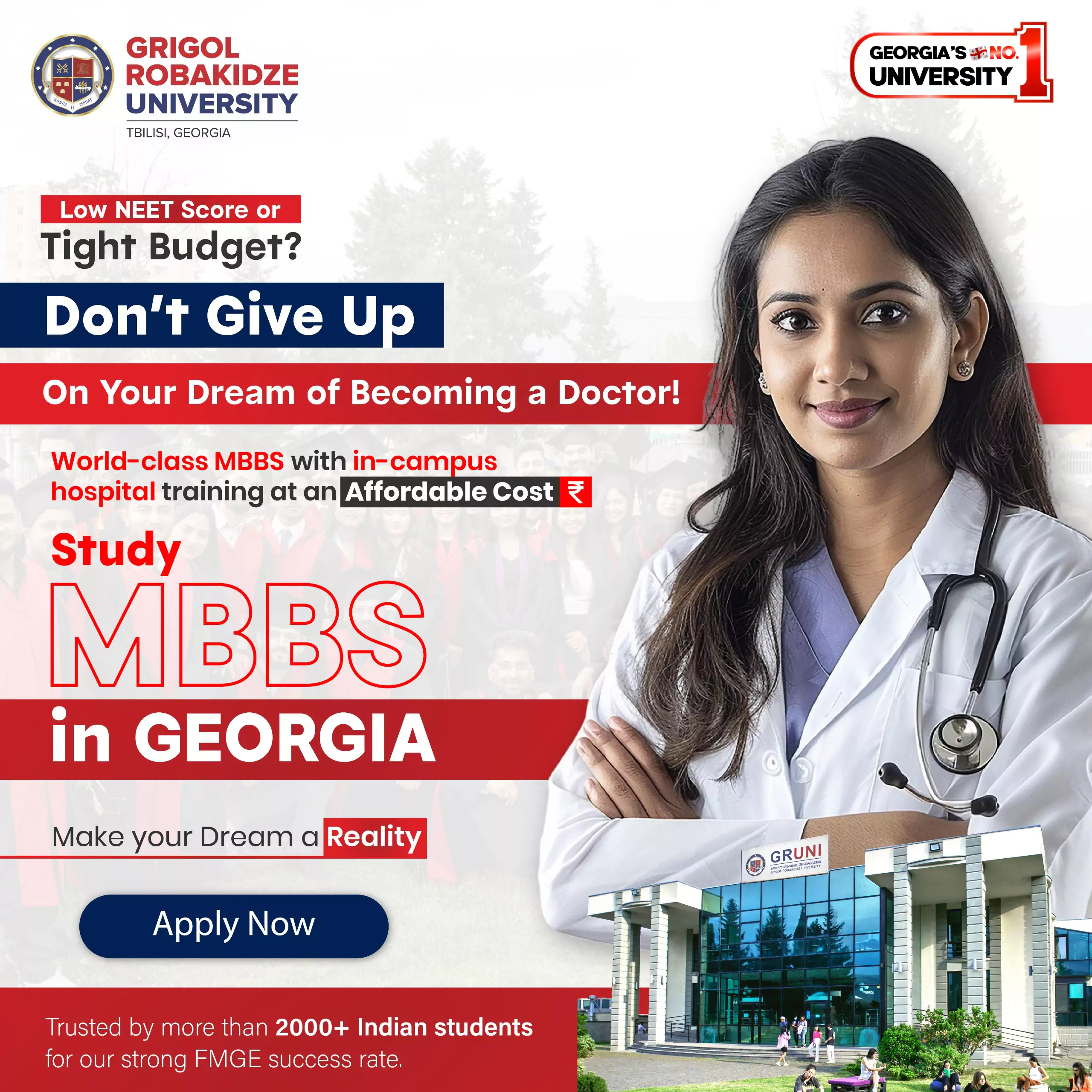Summary:
- GRUNI stands out for FMGE-oriented teaching, while TSMU has a legacy
- Despite being private, GRUNI is more cost-effective than TSMU
- Both universities top in Georgia when compared to Indian students’ enrollment
Georgia is fast emerging as a top MBBS abroad destination for Indian students. Among the top medical universities, Grigol Robakidze University (GRUNI) and Tbilisi State Medical University (TSMU) come first in Indian students’ minds for their quality education and international recognition. In this article, we compare both universities to help you make an informed decision for MBBS in Georgia.
Grigol Robakidze University (GRUNI)
- Located in the heart of Tbilisi, Georgia, is rapidly emerging as a top choice for Indian MBBS aspirants.
- Known for its affordable tuition, English-medium MD program, and strong emphasis on practical clinical training, GRUNI stands out among private medical universities in Georgia.
- It is officially listed by the National Medical Commission (NMC) and recognized by the WHO, ensuring global legitimacy of its degree.
- What makes GRUNI especially appealing to Indian students is its dedicated FMGE support system, featuring Indian faculty-led coaching, regular test series, and a curriculum that aligns with Indian exam standards.
Tbilisi State Medical University (TSMU)
- Tbilisi State Medical University (TSMU), founded in 1918 and officially named in 1992, stands as Georgia’s premier public medical institution, one of the oldest and largest in Eastern Europe.
- With around 7,500 undergraduates and 3,000 postgraduates, about 25% of its student body comprises international learners.
- Recognized globally by WHO, WFME, NMC, ECFMG, and listed in the World Directory of Medical Schools, its degree equips graduates for licensing exams like USMLE and FMGE
GRUNI vs TSMU: Quick Summary
| Feature | Grigol Robakidze University (GRUNI) | Tbilisi State Medical University (TSMU) |
| Location | Tbilisi, Georgia | Tbilisi, Georgia |
| Established | 1992 | 1918 |
| Type | Private University | Government/Public University |
| Medium of Instruction | English / Georgian | English / Georgian |
| Recognition | WHO, NMC, FAIMER, ECFMG, WFME | WHO, NMC, FAIMER, ECFMG, WFME |
| Student Diversity | International students from 15+ countries | Large global student community |
GRUNI Vs TSMU: Academic Quality
TSMU is the oldest and largest medical university in Georgia, with over 100 years of experience. It follows a structured curriculum aligned with European medical standards. The university offers strong academic support, modern labs and excellent clinical training.
GRUNI, although younger, offers a well-organised MBBS program taught in English. It focuses on practical training and personalised learning. The faculty includes experienced doctors and medical professionals.
GRUNI Vs TSMU: Academics Comparison
| Feature | Grigol Robakidze University (GRUNI) | Tbilisi State Medical University (TSMU) |
| Type | Private University | Government/Public University |
| Reputation | Emerging star among Indian students for affordability + FMGE coaching | Oldest and most reputed medical university in Georgia (est. 1918) |
| Curriculum | NMC-compliant 6-year MD program (54+12 months), integrated FMGE-focused coaching modules | WHO, NMC, ECFMG, and FAIMER recognized MD program; aligned with global licensure standards |
| Teaching Methodology | Focus on FMGE/NExT: Regular mock tests, Indian faculty support, case-based learning | Structured academic calendar, strong clinical rotations, diverse patient exposure |
| Clinical Training | Early hospital exposure from 3rd year; affiliated with local multi-specialty hospitals | Extensive hospital network with clinical exposure from 3rd year in large government hospitals |
| Faculty Quality | Combination of Indian and Georgian FMGE-focused faculty; good teacher-student ratio | Experienced Georgian faculty, some international lecturers; larger student base |
| Library & Labs | Digitized Indian textbook collection, active simulation & skill labs | Fully-equipped anatomy labs, large library, and practical-based classrooms |
| Student Mentorship | Dedicated Indian Student Cell; peer-led academic support system | Active student unions; academic mentoring by senior doctors and professors |
| FMGE Support | Regular FMGE mock tests, exclusive Indian batch guidance | Dedicated FMGE coaching cell for Indian students |
| Research Opportunities | Moderate; more practice-focused | Stronger institutional research ecosystem; ongoing academic publications |
| Language of Instruction | 100% English Medium | 100% English Medium |
Which is Better Academically?
- GRUNI stands out for FMGE-oriented teaching, affordability, and a student-centric model, ideal for budget-conscious Indian students focused on Indian practice.
- TSMU scores higher on legacy, infrastructure, and research orientation, making it a better fit for students aiming for global mobility or academic excellence.
Clinical Training Comparison: GRUNI vs TSMU
- GRUNI also provides clinical training through its affiliated hospital, PINEO, and offers higher opportunities compared to TSMU due to its balanced medical management.
- TSMU has direct affiliations with several government hospitals and clinics in Tbilisi. Students get early and strong exposure to patient care.
GRUNI Vs TSMU: Clinical Exposure Comparison
| Feature | Grigol Robakidze University (GRUNI) | Tbilisi State Medical University (TSMU) |
| Start of Clinical Training | From 2nd year onwards | From 3rd year onwards |
| Hospital Affiliations | Affiliated with mid-sized private and public hospitals across Tbilisi and surrounding districts | Attached to major government hospitals with large patient volumes |
| Patient Interaction | Early, supervised patient interaction in real-world settings | Extensive patient exposure across multiple specialties and departments |
| Specialty Rotations | Internal Medicine, Surgery, Pediatrics, Gynecology, Psychiatry, etc. | Full rotation cycle through all major and super-specialty departments |
| Simulation Labs | Modern simulation center for pre-clinical and clinical skills | Advanced simulation labs, including laparoscopic and emergency care training |
| Clinical Mentorship | Indian and Georgian doctors guide students through early-stage cases | Georgian professors + senior residents guide students; emphasis on structured learning |
| OPD/IPD Exposure | Moderate to high, depending on hospital tie-up | High volume OPDs/IPDs in busy state-run hospitals (urban settings) |
| Surgical Exposure | Supervised observation + basic assistance in later years | Rich surgical exposure; opportunity to assist in real procedures (final year & internship) |
| Internship Quality | 12-month clerkship-based internship at affiliated hospitals | 12-month state hospital internship, aligned with NMC/WHO standards |
| Assessment Style | Case-based practicals and internal clinical evaluations | Departmental rotations + viva + logbook-based assessments |
| Clinical Advantage for Indian Students | Smaller batches → more hands-on learning per student; focus on FMGE/NExT clinical MCQs | Larger hospitals = more cases, more departments; good for long-term clinical competency |
Which is Better for Clinical Training?
- GRUNI focuses on early exposure, student-friendly guidance, and FMGE-aligned clinical skill-building, which works well for students targeting Indian licensure.
- TSMU offers deeper clinical exposure due to its integration with large government hospitals, making it ideal for students aiming for strong foundational experience and global exams like USMLE/PLAB.
Note:
- Choose GRUNI for personal mentorship, FMGE-focused clinical grounding, and high interaction per student.
- Choose TSMU for volume, diversity, and hospital prestige.
Tuition Fee & Living Costs
| Expense Type | GRUNI (Approx.) | TSMU (Approx.) |
|---|---|---|
| Tuition Fee (Per Year) | USD 5,500 | USD 8,000 |
| Total Course Cost | USD 33,000 (6 years) | USD 48,000 (6 years) |
| Hostel | USD 2,500 | USD 2500 |
| Living Cost in Tbilisi | Similar for both universities | Similar for both universities |
GRUNI is more affordable, especially for students with a limited budget.
TSMU, being a government institution, charges higher tuition but offers more global exposure.
Admission Process
Both universities require the NEET qualification for Indian students and accept students directly without any entrance exam.
| Step | GRUNI | TSMU |
|---|---|---|
| NEET Required | Yes | Yes |
| Academic Eligibility | Minimum 50% in PCB | Minimum 50% in PCB |
| Application Timeline | September – February | June – September |
Recognition & Global Opportunities
Tbilisi State Medical University has broader international recognition, including ECFMG (USA) and WFME (World Federation for Medical Education), which opens more pathways for USMLE, PLAB, and other international licensing exams.
Grigol Robakidze University is also recognised by NMC and WHO, allowing Indian students to appear for FMGE/NExT in India.
Campus & Student Life
- TSMU offers a bigger campus, better research facilities, and a vibrant student community.
- GRUNI provides a friendly, supportive learning environment with smaller class sizes, ideal for personal attention.
Both universities offer Indian cuisine, hostel facilities, and a safe environment for international students.
Other Important Aspects for Comparison of GRUNI Vs TSMU
1. FMGE Passing Rate (Vital for Indian Students)
| University | Total Appeared (2024) | Passed | Passing % |
|---|---|---|---|
| GRUNI | 668 | 138 | 20.66% |
| TSMU | 703 | 215 | 30.58% |
While TSMU leads in percentage, GRUNI is among the top-performing private medical universities in Georgia, boasting steady and improving pass rates of 20.7% in 2024, 17.5% in 2023, and even 30.8% in 2022.
2. Batch Strength & Student Experience
- GRUNI enrols around 2,800 students, with compact batches and a large international intake, fostering stronger mentor–mentee relationships.
- TSMU, with over 7,500 undergraduates and 25% international students, offers diversity, but GRUNI’s smaller class size means more personalised attention.
3. Curriculum & FMGE Preparation
- Focused FMGE-oriented modules at GRUNI include mock tests, regular assessments, and even Indian-style pedagogy, making it highly supportive for Indian aspirants.
- GRUNI ensures an NMC-compliant MBBS structure with 54 months of theory + 12 months of internship, aligning perfectly with Indian licensing requirements.
4. Clinical Infrastructure
- GRUNI provides clinical training through affiliated hospitals and its own PINEO hospital, allowing early and hands-on exposure in patient care.
- TSMU, though large and well-known, operates via multiple university clinics, which can dilute mentor–student interaction.
5. Infrastructure & Modern Facilities
- GRUNI features modern labs, simulation centres, digital libraries, and smart-classroom settings. Its central urban campus places it at the heart of Tbilisi.
- TSMU similarly offers strong infrastructure but with the bustling dynamics of a much larger institution.
6. Faculty & Teaching Style
- GRUNI blends experienced local and Indian-origin faculty, ensuring a clear understanding of FMGE expectations.
- TSMU is reputed for having qualified faculty, but it follows a stricter semester repeat system; one failed subject may require you to repeat the entire semester. GRUNI’s smaller batch sizes often translate to a more supportive academic atmosphere.
7. Global Recognition & Licensing Pathways
Both universities hold approvals from WHO, NMC, ECFMG, FAIMER, and WFME.
Students from both institutions can sit for FMGE/NExT, USMLE, PLAB, or pursue postgraduate opportunities abroad.
Why GRUNI Is a Top Pick
- Strong FMGE record among private Georgian institutions.
- Personalised mentorship due to smaller cohort sizes.
- Dedicated FMGE preparation modules and mock exams.
- Modern teaching infrastructure in a prime urban campus.
- Cost-effective MBBS with holistic academic and clinical support.
Read Also: Can Indian Students Work While Studying MBBS in Georgia in 2025?
Read Also: NEET UG: Why Indian Students Prefer Georgia for MBBS in 2025?




What happened to you???
Have you had “HIGH FEVER” @edufever!?
Why do you think and started to promote Georgian 🇬🇪 medical colleges!?
Let us check out in our mother land “whether we have an ideal platform to support our homeland students..!”
I mean give priority for our INDIAN nation first!!!
🇮🇳 Jai Hind 🇮🇳
Sorry, but I beg to differ, and also appreciate your enthusiasm for nationalism. But your concern is unfounded and has no basis. You must first understand our motto and vision. And you must go through our website to see which college we promote, particularly for Indians.
Our vision is simple: to promote medical education among Indian students. With very limited seats available and very high cost of private colleges and western colleges, countries like Georgia, Russia or other low-budget colleges become an alternative destination for middle-class Indian students.
But anyway, thank you for your comment.